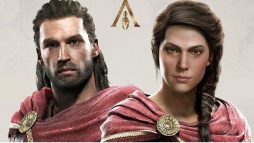Assassin's Creed Odyssey
From GameLabWiki
Assassin’s Creed Odyssey is an open world game of the Assassin’s Creed franchise and was published on multiple platforms in 2018. The main events unfold in the setting of the ancient greek empire, while a frame narrative is set in a modern day alternative reality.[1] In the very beginning of the game the player gets the chance to choose a character: one of the two siblings Alexios and Kassandra.
Research-Relevant Contents of the Game
Core Game Mechanics
In the following section we will take a closer look at the core game mechanics of Assassin’s Creed Odyssey and analyze how they make the game unique. The focus will be on certain contents, that make the research within the game evident.
Character Selection
The game starts with a flashback on the Persian War, where the player gets to play the king Leonidas. After the events unfold the player changes characters and a short cutscene starts that is set in the modern day. While the frame-narrative figure lays in a device called the ‚Animus‘, the player gets to adjust the settings of the game, like the level of difficulty. The most interesting part in this interactive cut-scene is the selection of the character, which is the choice between the siblings Kassandra and Alexios. This character choice defines the course of the game to a certain degree. Even though the mechanics of the game stay the same the two characters move in a certain way and interact differently with other non-player-characters within the game. The stats of the characters aren't modified in the beginning at all.

Playing with Perspectives
Throughout the game the player is able to follow different fates of people which he encounters during his journey. Depending on if and how they help them, the player gets to see the consequences of his actions. The game therefore forces the player to make discrete decisions, whose outcome are not visible from the very beginning.
For example, the player is able to help a family that has gotten sick and faces execution by a few soldiers in the first area of the game. If the player decides to help the family he will later encounter another village where the habitants have died because of the same plague, that has been spread only because of the family they left alive. What matters therefore are the actions of the player, which get some kind of moral validation and are in that course rated. The player is forced to see different perspectives on topics and their moral actions are put to the test., rather than their ability to play the game 'well'.
Related Research Approaches
Performing Gender
Through the selection of the character in the beginning of the game, the player is able to 'perform' the characters gender. One can look at how the avatars are performing their gender identity and thereby how a player can be a part of that performance in general. Because of the choice of the player, whether to play Kassandra or Alexios, the game confronts the player with different gendered characters. The game itself makes aware of this discourse through certain comments NPC's make throughout the game. One example is a female woodcutter, who comments on the fact what a strange job it is for a woman to be a mercenary. That comment is only made when the player in the fist place chooses to play as Kassandra.
Even though the mechanics and main story stay the same, one can argue that there is a different experience in playing as Kassandra or Alexios. Looking at the Gender Performance within the game it is possible to detect different associations within the game world.
Reflexivity on the Medium
Through the so called 'Animus' device through which the players avatar is able to visit the Ancient Greek Empire the game reflects on a certain degree on its own mediality. Thus the player and the avatar find themselves in a unknown world in which they are confronted with certain mechanics they have to master in order the fulfill their mission.
Morality of Decisions
- ↑ See also for further informations: https://en.wikipedia.org/wiki/Assassin%27s_Creed_Odyssey
